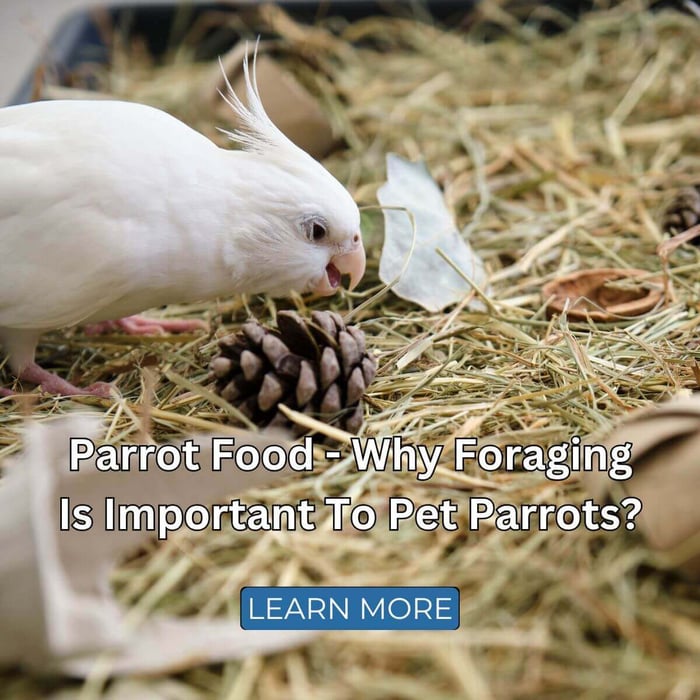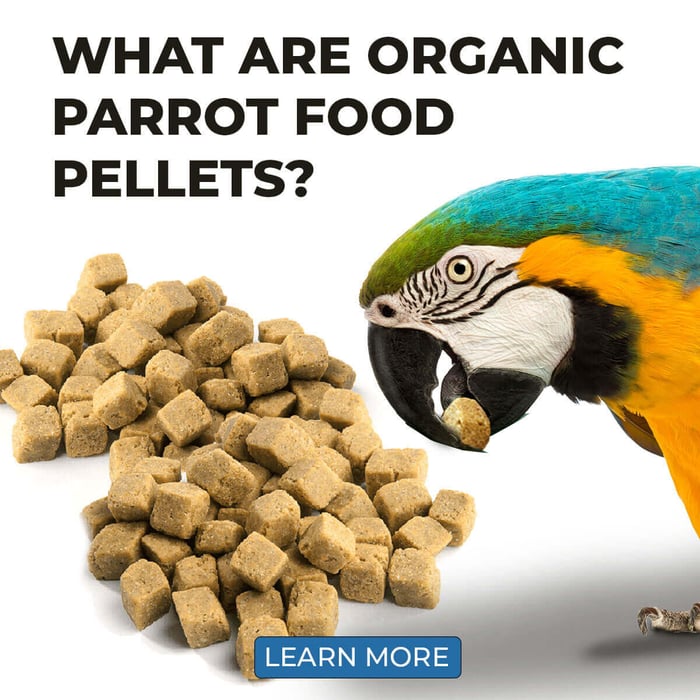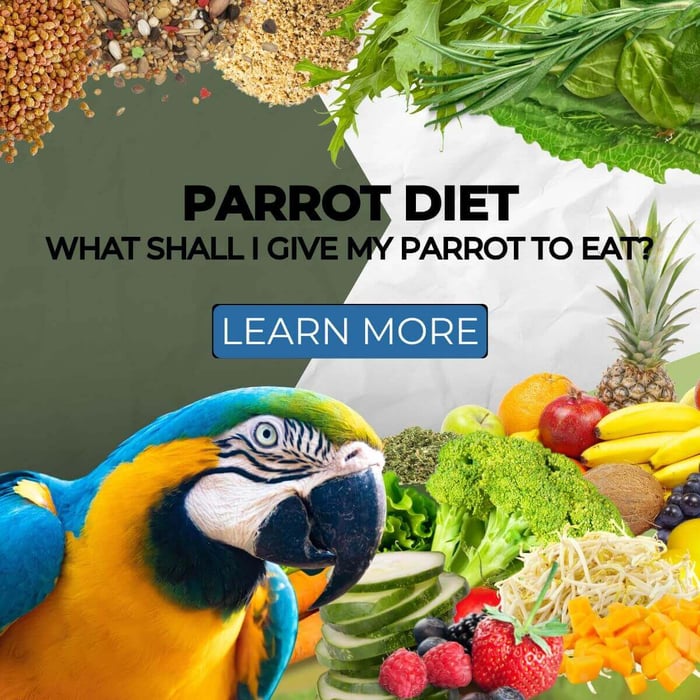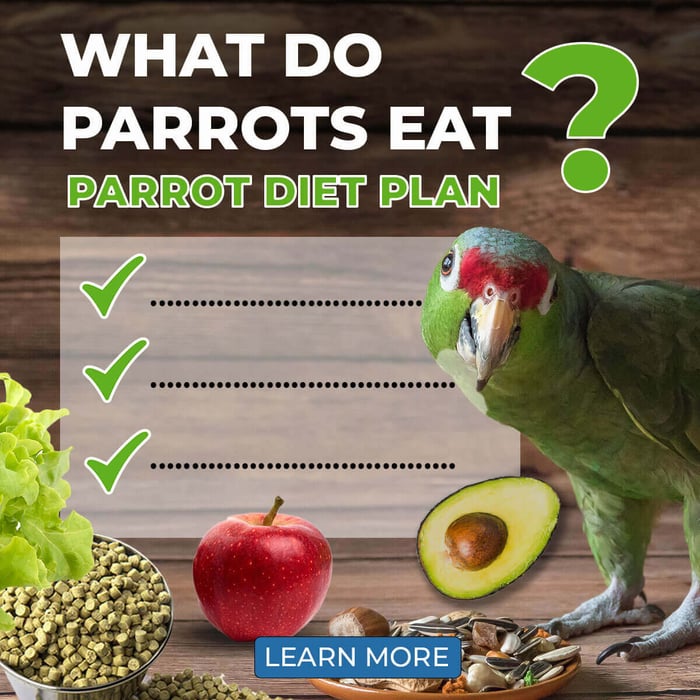Parrot Diet – Feeds, Seeds, and Health Needs
Feeding a healthy and balanced parrot diet is one of the most important tasks for keeping healthy pet parrots. You don't want to be the cause of any unwanted sickness, and you don't want to be the cause of any overfeeding. A large number of illnesses in pet parrots can be directly linked to an incorrect parrot diet and overfeeding. In this blog, we will provide you with a basic understanding of seed and complete diets for parrots and help you choose the right one for your feathered friend.
SEED VS COMPLETE PARROT DIETS
First and foremost, if you're feeding your parrot a mixture of seeds, fresh fruit, and vegetables, you are on the right track to keeping your parrot healthy.
FOOD TO AVOID
There are kinds of foods you must avoid feeding your parrot to eliminate the onset of unwelcome illness. These foods include high-fat junk food (obviously, we know this, but not uncommon), avocado, chocolate, alcohol, caffeine, fruit pits, persimmons, table salt, onions, apple seeds, and mushrooms. Many of the aforementioned foods are primarily what humans eat, and we strongly urge you not to feed your parrot processed or cooked foods on a regular basis – as a treat every now and then is fine. However, we recognise this as the first step towards poor health for your parrot. Processed food is bad for humans and twice as bad for pet birds. When was the last time you saw a McDonalds or Kebab shop in the jungle?
PICKY = OVER-FEEDING
What we all need to keep in mind is that parrots can be very picky when it comes to food. If you give them too many choices of different foods and large quantities of them, they will only eat what they like the most and waste the rest. Leading to a not-so-healthy food regime despite the high-quality ingredients you may be using. Almost 90% of the parrots in captivity I have come across are over-fed.
SEED PARROT DIETS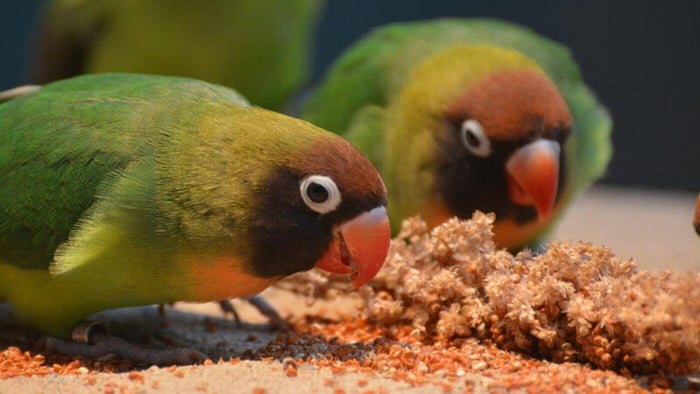
When considering seed diets, make sure they are low in sunflower seeds and rich in nutrition, and keep feeding to the appropriate quantity. Make an effort to recognise when you're overfeeding. If you are not sure how much to feed your parrot, try this simple technique: In the morning, feed your parrot normally. In the evening (around 8 pm), if there is still a lot of food in the bowl or uneaten food on the bottom of the cage and floor, then you are over-feeding. Start reducing the amount of food you deliver by small fractions until you notice that by the evening, all the food has been finished, and there is hardly any waste.
For those of you who prefer to feed twice per day, we suggest that you get the right amount first using the method above and then simply split it in two.
Here is a link to our range of healthy seed diets suitable for all parrots:
http://www.parrotessentials.co.uk/seed-diets-for-parrots
COMPLETE PARROT DIETS
Feeding on a complete parrot diet is, of course, very different. Complete diets contain everything that a bird needs when it comes to nutritional value, vitamins and minerals. This means you can feed your pet only on the pellets and nothing else. This will deliver the best possible diet to a pet parrot, and it will most certainly keep them in top condition.
Many parrot owners are not happy explicitly feeding strictly pellets and prefer to give fresh fruit and vegetables, too. That is fine, but then a complete diet becomes incomplete again. It is still 100% better than a bad sunflower-based seed diet. Right? If you are going to add a fresh mix to a complete diet, you need to make sure that it is not more than 15% of your daily food intake.
Here is the link to the complete parrot diets in our store: http://www.parrotessentials.co.uk/complete-diets-for-parrots
Let's take a look at potential causes of illness for your parrot and the optimal diet for your parrot.
POTENTIAL HEALTH RISKS & THE OPTIMAL PARROT DIET
Intuitively and factually, it makes sense that the main causes of illness in parrots is due to poor diet and poor environment. Other causes include trauma, but these are not as prominent as the above-mentioned. Optimising diet and environmental conditions are the key steps towards avoiding the many problems that avian veterinarians identify as avoidable. Poor or inadequate diet is the number one culprit causing illness. Dietary deficiencies cause a wide range of diseases, such as poor feather colour, feather picking, severe upper respiratory infections, and even egg binding when laying eggs.
Very often, Avian vets will recommend switching from a seed parrot diet to a complete parrot diet if your parrot has been on a poor food mixture regime over a long period of time that mainly consists of fatty nutrients or if your parrot is showing signs of the aforementioned health deficiencies. If switching is required, it should never be done overnight, and if there is evidence of a medical condition, consulting an avian veterinarian is of the utmost importance prior to doing so.
In most cases, 4 – 6 weeks is plenty of time to change from one diet to another. Start by introducing the new food in small quantities and increase the amount offered every 2 – 3 days. At the same time, the quantity of old food should be decreased by the same amount.
The Optimal parrot diet is something all parrot owners need to consider, given that we all want our feathery friends to tick the boxes for healthy immune and digestive systems. The optimal diet will also promote healthy cognitive and social development for your parrot. The best way to think about this diet is to think of what food would be good for a human with a heart condition.
A mixture of pellets, fruits and vegetables is a great option. Adding multivitamins and supplements is a good way to boost healthy immune system activity in conjunction with the aforementioned dietary recommendations. Treats are permitted, but moderation is key! We suggest honey sticks or nuts once a month or less. ALWAYS make sure their bowl is clean and disinfected at all times! Seeds are a great addition to an optimal diet. However, we will continue to stress how important it is to avoid sunflower and peanut-based diets. Warning: If there are leftover seeds, you are over-feeding, or if your bird is overweight despite the absence of a fatty seed diet, you're over-feeding.
Avoid any infections with a clean cage at all times. Your parrots are like 3 -4-year-olds – very intelligent, we might add but need that around-the-clock attention as much as possible. Clean bowls for both drinking and bathing are so important, and if you have more than one bird, make sure you are disinfecting their bowls on a daily basis.
CLOSING THOUGHTS
Well, we hope this helps you along your way to caring for your feathery friends and keeping them happy. A parrot diet is one thing, but optimal parrot care comes down to a holistic approach coupled with the utmost attentiveness. Remember, your parrot is like a young child; treat them like one, observe them like one. Always consult your nearest avian vet if you identify any irregularities or signs of disease. We know your parrot will be happy and healthy if you are considering all needs across the board.
FAQs
What are the main differences between seed diets and complete parrot diets?
Seed diets typically consist of a variety of seeds, which can lack certain essential nutrients if not properly balanced with other foods. Complete diets, on the other hand, are scientifically formulated to meet all your parrot's nutritional needs with the right balance of vitamins, minerals, and protein.
What foods should I avoid feeding my parrot to prevent health issues?
Avoid feeding your parrot avocado, chocolate, alcohol, caffeine, fruit pits, persimmons, table salt, onions, apple seeds, and mushrooms. These foods can be toxic to parrots and cause serious health problems.
How can I tell if I am over-feeding my parrot?
A good indicator of over-feeding is if there's leftover food in your parrot's bowl or scattered around the cage by the evening. Gradually reduce the amount of food until your parrot finishes its daily portion with little to no waste.
Can I combine fresh fruits and vegetables with a complete diet for my parrot?
Yes, you can supplement a complete diet with fresh fruits and vegetables to provide variety. However, ensure that these fresh additions do not exceed 15% of your parrot's total daily food intake to maintain the nutritional balance of the complete diet.
What should I do if I think my parrot is showing signs of a dietary deficiency?
If you suspect that your parrot is suffering from dietary deficiencies, consult an avian veterinarian as soon as possible. They can provide guidance on diet adjustments or supplements needed to address specific health concerns. Avoid making sudden dietary changes without professional advice.

